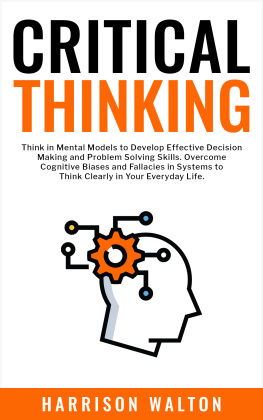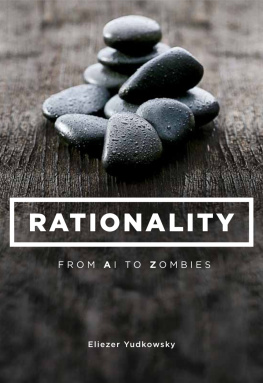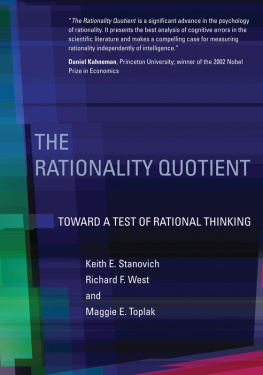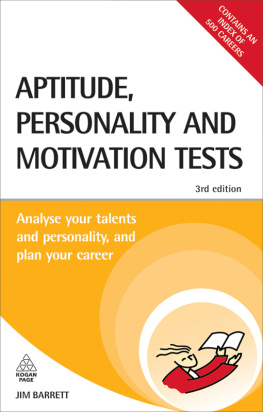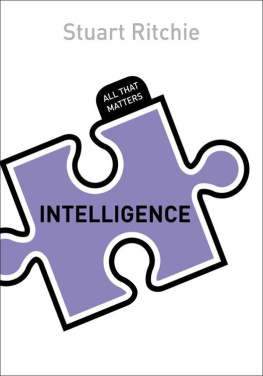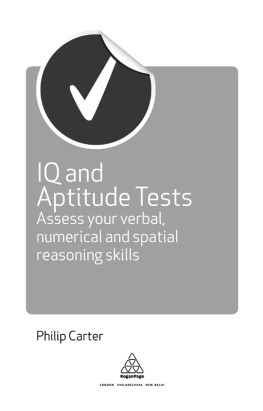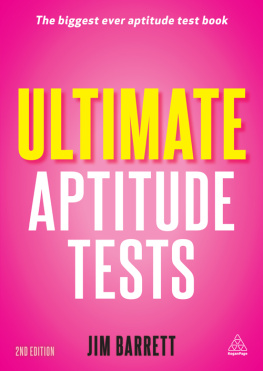WHAT INTELLIGENCE TESTS MISS
What Intelligence Tests Miss
The Psychology of Rational Thought
KEITH E. STANOVICH

Published with assistance from the Mary cady Tew Memorial Fund.
Copyright 2009 by Keith Stanovich.
All rights reserved.
This book may not be reproduced, in whole or in part, including illustrations, in any form (beyond that copying permitted by Sections 107 and 108 of the U.S. Copyright Law and except by reviewers for the public press), without written permission from the publishers.
Set in Electra type by Tseng Information Systems, Inc..
Printed in the United States of America.
Library of Congress Cataloging-in-Publication
Data Stanovich, Keith E., 1950
What intelligence tests miss : the psychology of rational thought / Keith E. Stanovich.
p. cm.
Includes bibliographical references and index.
ISBN 978-0-300-12385-2 (hardcover : alk. paper) 1. Intelligence tests.
2. Thought and thinking. I. Title.
BF431.s687 2009
153.9dc22 2008037325
A Catalogue record for this book is available from the British library.
This paper meets the requirements of ANSI/NISO Z39.48-1992 (Permanence of Paper).
It contains 30 percent postconsumer waste (PCW) and is certified
by the Forest Stewardship council (FSC).
10 9 8 7 6 5 4 3 2 1
For Paula,
who has never measured a persons worth in IQ points
PREFACE
In 2002, cognitive scientist Daniel Kahneman of Princeton University won the Nobel Prize in Economics for work done with his longtime collaborator Amos Tversky (who died in 1996). The press release for the award from the Royal Swedish Academy of Sciences drew attention to the roots of the award-winning work in the analysis of human judgment and decision-making by cognitive psychologists. Kahneman was cited for discovering how human judgment may take heuristic shortcuts that systematically depart from basic principles of probability. His work has inspired a new generation of researchers in economics and finance to enrich economic theory using insights from cognitive psychology into intrinsic human motivation.
In short, Kahneman and Tverskys work was about how humans make choices and assess probabilities, and they uncovered some very basic errors that are typical in decision making. Their work includes some of the most influential and highly cited studies in all of psychology, and it deserved to be honored with the Nobel Prize. One reason that this work was so influential was that it addressed deep issues concerning human rationality. As the Nobel announcement noted, Kahneman and Tversky discovered how judgment under uncertainty systematically departs from the kind of rationality postulated in traditional economic theory. The thinking errors uncovered by Kahneman and Tversky are thus not trivial errors in a parlor game. Being rational means acting to achieve ones own life goals using the best means possible. To violate the thinking rules examined by Kahneman and Tversky thus has the practical consequence that we are less satisfied with our lives than we might be.
The work of Kahneman and Tversky, along with that of many other investigators, has shown how the basic architecture of human cognition makes all of us prone to these errors of judgment and decision making. But being prone to these errors does not mean that we always make them. Every person, on some occasions, overrides the tendency to make these reasoning errors and instead makes the rational response. It is not that we always make errors all the time. Even more important, it has been shown that there are systematic differences among individuals in the tendency to make errors of judgment and decision making. My own research group has tried to find out what predicts these individual differences.
The fact that there are systematic individual differences in the judgment and decision-making situations studied by Kahneman and Tversky means that there are variations in important attributes of human cognition related to rationalityhow efficient we are in achieving our goals. It is a curious fact that none of these critical attributes of human thinking are assessed on IQ tests (or their proxies such as the SAT test). This fact is curious for two related reasons. First, most laypeople are prone to think that IQ tests are tests of, to put it colloquially, good thinking. Scientists and laypeople alike would tend to agree that good thinking encompasses good judgment and decision makingthe type of thinking that helps us achieve our goals. In fact, the type of good thinking that Kahneman and Tversky studied was deemed so important that research on it was awarded the Nobel Prize. Yet assessments of such good thinking are nowhere to be found on IQ tests.
A second, and related, point is that when people use the term intelligence (again, laypersons and psychologists alike), they often talk as if the concept of intelligence encompassed rationality. For example, many conceptions of intelligence define it as involving adaptive decision making. Adaptive decision making is the quintessence of rationality, but the items used to assess intelligence on widely accepted tests bear no resemblance to measures of rational decision making. This creates some curious phenomena that we do in fact tend to notice. We do tend to notice, and to find mildly perplexing, smart people doing dumb things. But the way that we have historically measured intelligence makes this phenomenon not perplexing at all. If by smart we mean IQ-test smart and by dumb we mean poor decision making, then the source of the phenomenon is clear. IQ tests do not measure adaptive decision making. So if we are surprised at a high-IQ person acting foolishly, it can only mean that we think that all good mental attributes must co-occur with high intelligencein this case, that rational thinking must go with high intelligence. However, research is increasingly bringing this assumption into question. Rational thinking skills of the type studied by Kahneman and Tversky show only small-to-medium correlations with intelligence test performancenot surprisingly, because tests of the latter make no direct assessment of the former.
In the present book, I explore the issue of whether they should. Judgment and decision-making skillsthe skills of rational thoughtare at least as important as the attributes that are assessed on IQ tests. Like intelligence, rational thinking skills relate to goal achievement in the real world. Yet we fail to teach them in schools or to focus our attention on them as a society. Instead, we keep using intelligence proxies as selection devices in educational institutions from exclusive preschools to graduate schools. corporations and the military are likewise excessively focused on IQ measures. The lavish attention devoted to intelligence (raising it, praising it, worrying when it is low, etc.) seems wasteful when we virtually ignore another set of mental skills with just as much social consequence.
The thinking skills studied by Kahneman and Tversky cash out in terms of real-world behaviors that affect peoples happiness and well-being. They are just as important as the cognitive skills assessed on IQ tests. Intelligence tests are thus radically incomplete as measures of cognitive functioning. Because of their vast influence, IQ tests have both explicitly and implicitly defined, for the layperson and psychologist alike, what cognitive attributes to value. These are important abilities, to be sure, but the tests leave out huge domains of cognitive functioning. We do not need to stretch to noncognitive domainsto notions such as emotional intelligence or social intelligenceto see important lacunae in the tests. That would be implicitly conceding too much. It would seem to concede that the tests cover the cognitive domain quite well and that we need to go outside the cognitive domain, or at least straddle it (into things like emotion, creativity, aesthetic sensibility, interpersonal skills) in order to find things that IQ tests miss. I believe we need not look so far afield. The skills of judgment and decision making are cognitive skills that are the foundation of rational thought and action, and they are missing from IQ tests.
Next page

